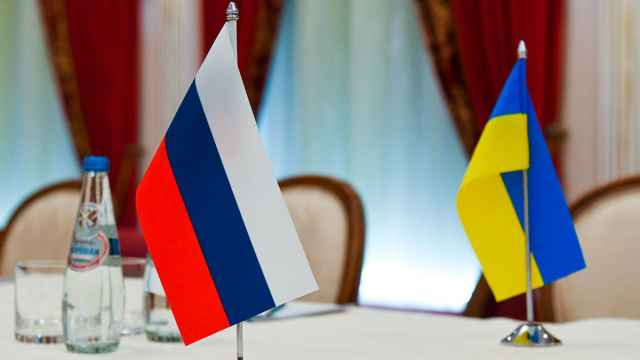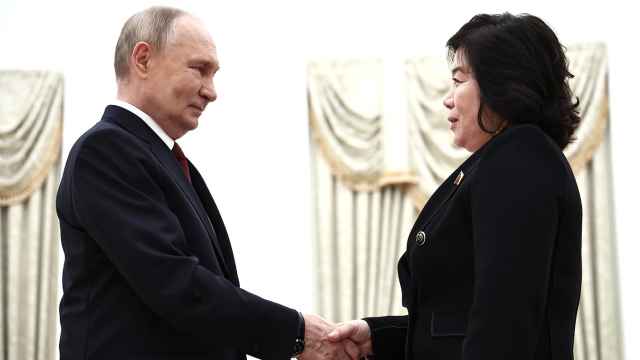This Spring's French presidential election was set to be win-win for the Kremlin. Republican party candidate Francois Fillon, a man with personal ties to Putin who has called for sanctions to be lifted, was leading in the polls. His only rival was pro-Kremlin, far-right Elysee hopeful Marine Le Pen. Moscow rejoiced.
What a difference a fortnight makes.
On Jan. 27, Fillon's campaign became embroiled in scandal. In what became known as “Penelope Gate,” the candidate was thrust under investigation for abusing public funds. He is accused of using parliamentary money to bankroll Penelope, his Welsh wife, over an eight year period for doing a job she never did. French media later revealed Fillon's daughter was also employed by him during a law traineeship.
It is not illegal for French politicians to employ relatives, but the conservative candidate apparently went
a step too far — rocking a country where politicians are routinely embroiled in scandal. It has also made the battle over who will lead one of the EU's founding members fiercer and more unpredictable.
With Fillon's ongoing implosion, Moscow is turning up the heat on the only credible candidate challenging the Kremlin line: Emmanuel Macron.
Fillon’s Last Stand
But the future of Fillon's candidacy is still up in the air. This week, he apologized for deceiving the public but maintained he was acting in accordance with French law. He also insisted he would still run for office. “All of this was legal,” he said. “But was it moral?” It was “up to the French” to decide, he said.
To make matters worse for Les Republicains, Fillon's former boss and former president Nicolas Sarkozy is also facing trial in a campaign corruption case.
Fillon is no longer leading in the polls. One recent survey shows that many of his voters have turned their back on him. Some 65 percent of those polled said they wanted him to be replaced as the party's candidate. But the future of his candidacy is still unclear – with two months until the first round vote, anything could happen.
Russian foreign policy analyst Mikhail Troitsky says Fillon remains the best possible option for Russia. “He is somebody deeply embedded in mainstream politics, but also willing to talk to Russia and consider its demands,” he says.
Russia is hoping that Fillon will pull through to face Le Pen. And in order to do so, it wants to sabotage Macron's chances.
Enter The Centrist
The implosion of the French right has propelled centrist candidate Emmanuel Macron into the limelight. As an independent candidate, France's former Economy Minister has avoided the recent drama of party politics. Following the scandals, he replaced Fillon as the favourite to face Le Pen in April.
The 39-year-old is not well known outside of France. Until now, he was largely ignored by the Kremlin. Although he visited Moscow last year as a government minister and called for the normalization of trade ties, hinting at lifting sanctions, Macron is strongly pro-European and an ally of Angela Merkel. Along with green candidate Yannick Jadot — who has no chances in the election — Macron is the only French presidential hopeful who has talked about the crackdown on human rights in Russia.
“This makes him an adversary for Moscow,” says political scientist Vladimir Frolov.
Russian state media has zoomed in. Dmitry Kiselyov, the host of leading propaganda news show Vesti Nedeli [Weekly News] described Macron as an “appointee of the global elite.” The Russian government's print mouthpiece, Izvestia, suggested Wikileaks founder Julian Assange had unpublished material compromizing Macron. Then, on the Kremlin’s online news site Sputnik, former Republican deputy Nicolas Dhuicq said Macron was being backed by a “very rich, gay lobby.” To top it off, Dhuicq claimed that Macron was having a gay affair with radio boss Mathieu Gallet outside of his marriage to his former high school teacher.
Following the smear campaign, Marcon dismissed claims he was having an affair. “If you're told I lead a double life with Mr. Gallet, it's because my hologram escaped,” he told supporters on Tuesday Feb. 9.
Pavel Chinsky, who runs the Franco-Russian Chamber of Commerce, says that France is paying too much attention to Russian media. “The legacy of the U.S. election is that everybody is talking about Russia,” he says. For Chinksy, Europeans increasingly see Russia as much more powerful than it really is. “There is no proof in any of these interference theories.”
But French authorities are not so sure.
After initially breaking “Penelope Gate,” weekly magazine Le Canard Echaine revealed on Wednesday that intelligence services had invited all political parties to be briefed on Russian cyber attacks. According to the magazine, the Front National was the only party that did not attend the meeting after declining the invitation. French media also reported that the country’s Defense Council is planning to meet about Russian cyber attacks at the Elysee.
“We expect attacks on Marcon to increase in the coming weeks, especially on social networks,” says French political scientist Nicolas Tenzer.
Moscow’s Plan B
What looks certain in this election, is that far-right Marine Le Pen will make it to the second round.
The 48-year-old Front National leader has made no secret of her ties to Russia. She has admitted to borrowing money from banks with Kremlin links, and has traveled to Moscow and Russian-occupied Crimea several times. Last week, Le Pen told CNN that sanctions on Russia are a “total stupidity” and that Crimea “has always been Russian.”
But does Russia love Le Pen back?
Her position on Frexit — and against NATO — are welcomed by Russia. Russian state television hails her as an anti-EU freedom fighter who will be loyal to Russia. But unlike Francois Fillon, who is respected in the highest echelons of the Kremlin, Marine Le Pen is greeted by low rank Russian bureaucrats on official visits to Moscow. In December, she was unable to get a larger Russian payment to fund her presidential campaign.
Having been in the public eye longer than any of the other candidates, the latest polls suggest Le Pen may not longer be able to ride her anti-establishment wave. A daily opinion survey showed both Macron or Fillon would be able to defeat the far-right veteran in the presidential run-off scheduled for May 7.
But with two months until the first round of the vote, President Le Pen is no longer impossible. And Moscow will gladly help - not so much by supporting Le Pen but rather by discrediting Macron through a social media campaign and block him from making it to the second round.
A Message from The Moscow Times:
Dear readers,
We are facing unprecedented challenges. Russia's Prosecutor General's Office has designated The Moscow Times as an "undesirable" organization, criminalizing our work and putting our staff at risk of prosecution. This follows our earlier unjust labeling as a "foreign agent."
These actions are direct attempts to silence independent journalism in Russia. The authorities claim our work "discredits the decisions of the Russian leadership." We see things differently: we strive to provide accurate, unbiased reporting on Russia.
We, the journalists of The Moscow Times, refuse to be silenced. But to continue our work, we need your help.
Your support, no matter how small, makes a world of difference. If you can, please support us monthly starting from just $2. It's quick to set up, and every contribution makes a significant impact.
By supporting The Moscow Times, you're defending open, independent journalism in the face of repression. Thank you for standing with us.
Remind me later.






